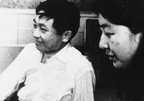Films by Ogawa Productions
Source: Yamagata Documentary Film Library
Sea of Youth
 JAPAN / 1966 / Japanese / B&W / 16mm / 56 min
JAPAN / 1966 / Japanese / B&W / 16mm / 56 min
Staff: Ogawa Shinsuke (Director), Okumura Yuji (Photography), Otsu Koshiro, Kawana Mitsuo, Kubota Yukio, Kuribayashi Toyohiko, Kobayashi Hideko, Jin Kohei, Tamura Masaki, Tateishi Yasuaki, Nakano Ryo, Yamane Makoto, Wada Shu, Iwasa Hisae.
Production: Society for Making a Documentary Film on University Correspondence
Ogawa Shinsuke’s directorical debut traces the struggle of four students who lead the opposition against the Ministry of Education’s proposed revision to the university correspondence school systems in 1966. During their struggle, the four students are forced to re-examine the way of life they have led until now: is the slogan “Working while you study is wonderful” true? And why after having worked so hard, must they still study? Ogawa’s camera embraces them, sharing their confusion, their worries, their agony and their determination not to end their fight, and literally starts running with them. The passion of the four students and of the filmmakers blends together to make this a “youth film” in the truest sense of the word.
Summer in Narita
 JAPAN / 1968 / Japanese / B&W / 16mm / 108 min
JAPAN / 1968 / Japanese / B&W / 16mm / 108 min
Director: Ogawa Shinsuke
Directorial Assistants: Jin Kohei, Matsumoto Takeaki, Yoshida Tsukasa
Photography: Otsu Koshiro, Tamura Masaki
Camera Assistant: Otsuka Noboru
Sound: Kubota Yukio Scripter: Kuribayashi Toyohiko
Producers: Kobayashi Hideko, Fuseya Hiroo, Ichiyama Ryuji
Production Manager Nosaka Haruo
Music: Beethoven’s “9th Symphony,” Hayashi Hikaru’s “The Good Woman of Setzuan”
Production Company: Ogawa Productions
1968—the year students and workers revolted against established authorities around the world. In Narita, Japan, residents of the farming village Sanrizuka rose up in protest against the New Tokyo International Airport Project, a project that had been decided upon without any respect to local concerns. This film is the first in Ogawa Productions’ eight-year, seven-films Narita series. It was through this series that Ogawa and Ogawa Productions established their method of filming while living with the people they were filming. The camera follows the “Youth Brigade” as they decide to use arms in their struggles against the riot police. Ogawa said about this film: “All the shots were taken from the farmers’ side—we were always amongst them, shooting from their perspective. Even when we were shooting the authorities, we shot everything, face-on and also in contrast to this.”
Magino Story—Raising Silkworms
 JAPAN / 1977 / Japanese / Color / 16mm / 112 min
JAPAN / 1977 / Japanese / Color / 16mm / 112 min
Director: Ogawa Shinsuke
Photography: Hara Tadashi
Blow-up to 16mm: Tamura Masaki
Editing: Fukuda Katsuhiko
Negative Editor: Takahashi Tatsuo
Sound: Uriu Toshihiko
Appearance: Kimura Sato, Kimura Shuichi, Kimura Hatsu, Shiraishi Yoko, Mikado Sadatoshi
Producers: Iizuka Toshio, Fuseya Hiroo
Production Company: Ogawa Productions
The film opens with an old woman recounting a folk tale concerning silkworms (she calls them “honorable worms,” in which the Magino silkworms are seen as the reincarnation of a vanished princess, and as messengers of the gods. In the folk tale it is said that the pattern on the bodies of the silkworms is the same as the hoof print of the horse that protected the princess. This introduction draws us into the world of raising silkworms. Ogawa and his staff spin out a film from the process of actually raising silkworms themselves, under the direction of Kimura Sato, a woman who has spent half her life with the silkworms. The film shows us in exquisite detail the process involved: from the birth of the silkworms in the spring, through the selection of mulberry leaves for their food and the repeated shedding of their skins as they grow, to the cocoons that they make in time for the autumn. Along with Ogawa and his staff, we come to share the same sense of “time” as Sato, who has spent many years with the silkworms. This time spent with Sato, in particular, formed the basis of the opened attitude that Ogawa demonstrated in his later films after moving to Magino and working as both filmmaker and farmer.
